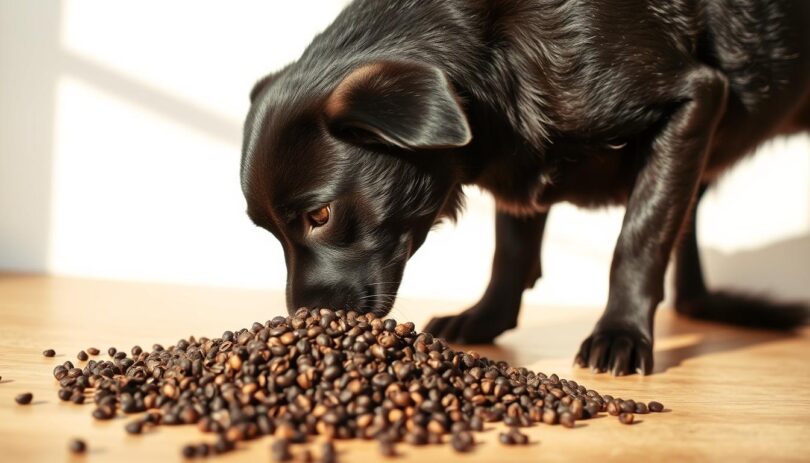Did you know 68% of pet owners admit to sharing table scraps with their furry companions? While many human foods are harmless, spices like black pepper require careful consideration.
When sprinkled lightly on dog-safe meals, this common seasoning typically poses minimal risk. However, overuse may lead to digestive upset or irritation. Unlike toxic ingredients such as garlic, small amounts rarely cause severe harm.
Pet parents should monitor portion sizes and avoid dishes containing multiple seasonings. Understanding safe quantities helps prevent health complications while allowing occasional flavor enhancements.
This article explores both potential benefits and hidden dangers. Future sections will discuss how combining this spice with turmeric might support joint health. Always consult your veterinarian before introducing new elements to your pet’s diet.
Understanding Black Pepper and Its Role in Dog Diets
Black pepper originates from dried berries of the Piper nigrum plant. This versatile spice enhances flavor in countless dishes worldwide. Its sharp, earthy taste comes from piperine – a compound that adds depth to soups, meats, and vegetable recipes.
What Is Black Pepper and How Is It Used?
Chefs and home cooks rely on this seasoning to elevate meals. Ground peppercorns appear in spice blends, marinades, and rubs. While safe for humans, its intensity requires careful handling when pets are involved.
Importance of Moderation in Dog Diets
Animal nutritionists stress that minimal seasoning suits pets best. A pinch on plain chicken or rice might be tolerated. However, garlic or onion powder – common in human food – poses serious risks.
Veterinary experts recommend limiting table scraps to 10% of a pet’s daily intake. Balanced commercial meals provide essential nutrients without unnecessary additives. Over-seasoned dishes could trigger stomach irritation or long-term health issues.
Upcoming sections explore how controlled spice use intersects with wellness. Always prioritize veterinary guidance before modifying your companion’s nutrition plan.
Can Dogs Eat Black Pepper? Navigating the Risks
While occasional exposure might seem harmless, certain reactions indicate when pets struggle with spice sensitivity. Observant owners should watch for subtle changes in behavior after accidental ingestion.
Recognizing Signs of Overexposure
Mild symptoms often appear first. Sneezing fits or watery eyes may occur if particles become airborne. Gastrointestinal distress like nausea typically follows ingestion, sometimes progressing to repeated vomiting or loose stools.
Respiratory irritation manifests through persistent coughing. These reactions usually surface within hours and vary based on portion sizes. Immediate veterinary consultation becomes crucial if labored breathing develops.
Health Problems Linked to Excessive Intake
Chronic exposure elevates risks beyond temporary discomfort. Anal gland inflammation occasionally develops due to digestive strain. Frequent stomach irritation might also weaken gut health over time.
Seasoned table scraps pose hidden dangers. Dishes containing multiple spices amplify these effects. A single incident rarely causes lasting harm, but repeated episodes could compromise immunity or nutrient absorption.
Owners should store spice containers securely and avoid sharing heavily seasoned foods. When unusual symptoms persist beyond 24 hours, professional medical evaluation ensures timely intervention.
Enhancing Health Benefits by Mixing Spices
Pet owners increasingly explore natural supplements to support their companions’ wellness. Combining specific spices unlocks synergistic effects that single ingredients can’t achieve alone. When used thoughtfully, these pairings offer targeted advantages without overwhelming sensitive systems.
The Power of Turmeric and Black Pepper Together
Turmeric has been added to animal diets for centuries due to its anti-inflammatory properties. Its active compound, curcumin, helps manage joint discomfort and oxidative stress. However, curcumin alone struggles to absorb effectively through digestion.
Adding a tiny amount of black pepper changes this dynamic. Research shows piperine – a key component in pepper – increases curcumin’s bioavailability by up to 2,000%. This partnership allows more antioxidants to reach the bloodstream, amplifying turmeric’s benefits.
How Piperine Boosts Curcumin Absorption
Studies on pets with osteoarthritis reveal measurable improvements when both compounds are present. Dogs receiving this combination showed reduced stiffness and better mobility compared to those given turmeric alone. Even minor absorption boosts translate to noticeable relief.
The ratio matters significantly – 1/8 teaspoon of turmeric paired with a pinch of pepper suffices for most medium-sized pets. Always consult a veterinarian to determine safe quantities tailored to your companion’s needs. Proper dosing ensures benefits outweigh potential risks.
Expert Insights on Seasoning and Safe Dog Food Practices
Veterinary professionals emphasize the critical role of dietary caution when introducing new flavors to pets. Thoughtful seasoning use requires balancing potential benefits with proven safety protocols. Let’s explore evidence-based strategies for incorporating spices while prioritizing animal wellness.
Veterinarian Guidelines on Using Seasonings with Dog Food
Animal nutrition experts recommend commercial pet food as the foundation of daily meals. These products meet strict nutritional standards without unnecessary additives. If adding spices, limit them to 1-2 pinches weekly for flavor enhancement.
Turmeric paired with minimal black pepper shows promise for joint support when approved by a vet. However, overuse may trigger stomach sensitivity. Always start with microscopic quantities and monitor reactions closely.
Common table scraps often contain hidden dangers like garlic powder or excessive salt. Even seemingly harmless dishes could disrupt gut health. Safer options include plain cooked meats or vegetables without sauces.
Approved seasonings like basil or parsley add variety when used sparingly. Avoid chili powder, onion, or nutmeg entirely. Regular check-ups help identify dietary issues before they escalate.
By following veterinary advice and prioritizing balanced nutrition, owners support long-term vitality. Simple choices today prevent complex health challenges tomorrow.
Final Thoughts on Spice Safety and Your Dog’s Well-Being
Balancing flavor and safety remains essential for pet owners exploring spice use. Small quantities of black pepper rarely harm healthy pets, but overuse risks digestive upset or respiratory irritation. Pairing it with turmeric boosts anti-inflammatory effects through piperine’s absorption-enhancing properties.
Moderation prevents common issues like vomiting or diarrhea. Veterinarian-approved guidelines suggest limiting seasonings to occasional pinches in plain meals. Always prioritize commercial diets meeting nutritional standards over seasoned table scraps.
Key practices include monitoring spice quantities and avoiding mixed seasonings. Thoughtful use supports joint health and gut function without overwhelming sensitive systems. Store spices securely and consult professionals before dietary changes.
Ultimately, spices like turmeric and black pepper can complement wellness strategies when handled responsibly. Your pet’s health thrives on cautious experimentation paired with expert guidance – a recipe for long-term vitality.
FAQ
Is black pepper toxic to pets?
Black pepper isn’t inherently toxic, but excessive amounts can irritate a dog’s digestive system. Mild symptoms like sneezing, vomiting, or diarrhea may occur if they consume large quantities. Always monitor portion sizes.
How does piperine affect nutrient absorption in dogs?
Piperine, a compound in black pepper, enhances curcumin absorption from turmeric. This combination supports joint health and reduces inflammation, but consult a veterinarian before adding spices to your pet’s meals.
Are table scraps seasoned with black pepper safe?
Table scraps often contain added salt, spices, or oils that upset canine stomachs. Avoid sharing seasoned human food—stick to unseasoned, vet-approved treats to prevent gastrointestinal issues.










Leave a Comment